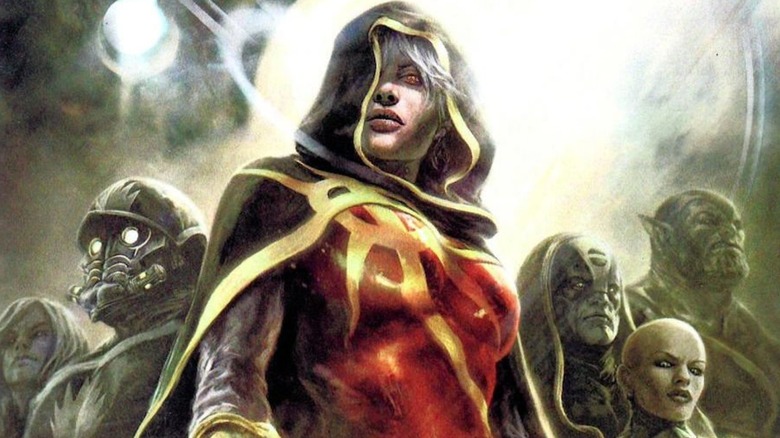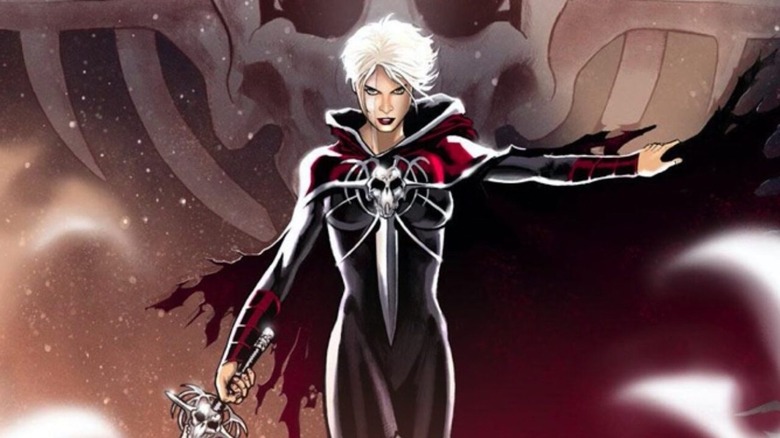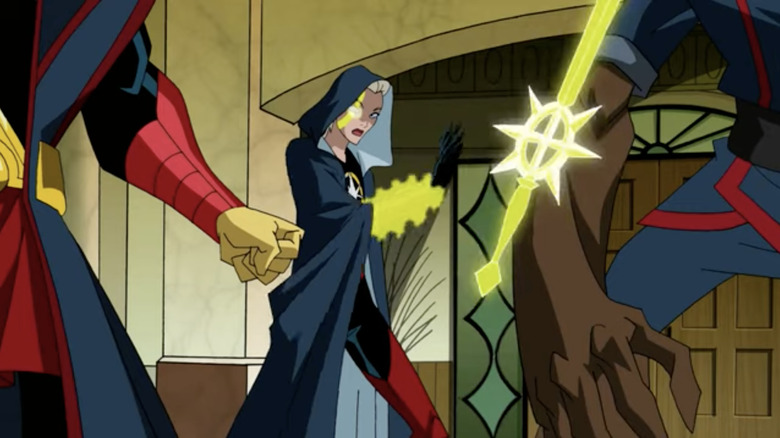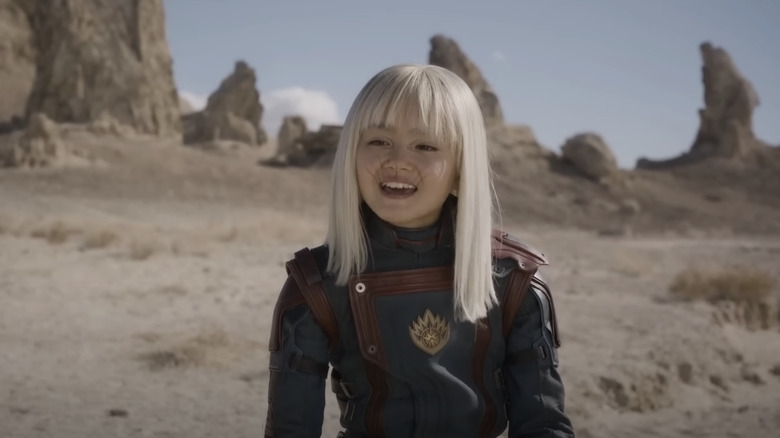Who Is Phyla In Guardians Of The Galaxy 3? The Comic Origins Of The New Team Member
"Guardians of the Galaxy Vol. 3" ended with a new team of Guardians led by Rocket Raccoon (Bradley Cooper). One of their number was Phyla (Kai Zen), a young white-haired girl and freed test subject of evil geneticist the High Evolutionary (Chukwudi Iwuji).
If you're a comics fan, then yes, you likely realized that this was indeed the Marvel Cinematic Universe incarnation of the hero Phyla-Vell. If you only watch the movies, you're still thinking (to quote Korath the Pursuer), "Who?!" Well, let me explain.
In the comics, Phyla is the daughter of Captain Marvel — the alien warrior Mar-Vell, not Carol Danvers. Annette Benning played a female version of Mar-Vell in 2019's "Captain Marvel," but the character is traditionally male. Mar-Vell and his progeny are Kree, the imperious race to which "Guardians of the Galaxy" villain Ronan The Accuser (Lee Pace) belonged. The Kree have both blue and pink-shaded skin; Ronan is the former while Mar-Vell and Phyla are the latter.
The character was created by Peter David and Paul Azaceta during their run on "Captain Marvel" in 2004. At the time, her brother Genis-Vell was the good captain, and Phyla got tenure with the title too after her debut in issue #16. In case you didn't catch it, her name is a pun on "phylum" (a taxonomy classification), like how her brother's is one on "genus."
From there, Phyla was an important character in Dan Abnett and Andy Lanning's 2008 "Guardians of the Galaxy" comic run, the blueprint for the MCU trilogy.
Quasar the Guardian
Abnett and Lanning's story kicks off in the crossover event "Annihilation: Conquest." The Phalanx, a robotic race led by Ultron, conquers and enslaves much of the galaxy. It falls to the cosmic heroes of the Marvel Universe to fight back. During this event, Phyla acquires the energy-manipulating Quantum Bands (see onscreen in "Ms. Marvel" and "The Marvels"); she forges them into a "Quantum Sword" and takes up the identity Quasar. Her lover Moondragon (daughter of Drax) is slain by Ultron, so she repays the android in the final issue by dealing him a death blow with her sword.
After the Phalanx invasion, Peter Quill/Star-Lord decides to create the Guardians of the Galaxy to prevent another cosmic catastrophe. Phyla is one of his recruits, alongside Gamora, Drax, Rocket, Groot, Adam Warlock, and Mantis. Here's a key difference between the comics Guardians and how James Gunn rewrote them in the movies; they're not a motley crew of losers brought together by chance. They're all renowned heroes and soldiers, the best of the best, assembled with a specific purpose (in fact, it's later revealed Quill had Mantis telepathically manipulate all the Guardians to get on board with his idea, but that's a story for another time).
Halfway through the run, Phyla brings Moondragon back from the afterlife; losing the Quantum bands and agreeing to become the avatar of Death, she adopts the name "Martyr" with a new black costume. The run ends with her being killed by Thanos; Phyla and Moondragon have swapped the position of mourner and mourned. Unusual for a comic character, she hasn't been resurrected. The closest is Al Ewing using an alternate-universe version of Phyla during his subsequent "Guardians" run. I'd bet this goes back to synergy with the movies.
Martyred by the MCU
The Guardians of the Galaxy's first big media appearance outside the comics was not the movie, but "Michael Korvac," a 2012 episode of the cartoon "Avengers: Earth's Mightiest Heroes." Phyla (voiced by Moira Quirk) appears as Quasar alongside Star-Lord (played by Master Chief John-117 himself Steve Downes), Rocket, Groot, and Adam Warlock.
This episode slots into the small sliver of time when the Guardians had been elevated to prominence by Abnett and Lanning, but before Gunn's cinematic reinterpretations completely supplanted the comics. The tell is how in "Earth's Mightiest Heroes," the Guardians have their blue-and-red comic uniforms, not the hodgepodge costumes of the movies. Likewise, the absence of Drax and Gamora; if the episode had aired a few years later, I guarantee Phyla and Warlock would've been left out instead. Sure enough, the 2015 "Guardians of the Galaxy" cartoon uses the movie line-up and designs (Phyla only appears in season 3).
I'd say Phyla is still waiting for resurrection because of the movies too. The comic Guardians of the Galaxy have become more and more like the MCU versions, with the perennial members whittled down to the five movie founders. Since Phyla-Vell is not part of that iteration, there's no incentive to bring her back. If anything, the demand for synergy means it makes more sense to leave her dead.
So, that brings us to the question of why it took three movies for Phyla to just get a cameo.
Discovery of a new Phyla
Abnett and Lanning's "Guardians of the Galaxy" has a large ensemble (the team has about a dozen members, though rarely all at the same time). That said, even if they killed her off, they clearly liked Phyla. She's one of the focus characters and gets more page time than, say, Gamora. So why was the latter chosen to be the token girl Guardian in the movies?
Gunn hasn't publicly said how Phyla got excluded from the 2014 "Guardians of the Galaxy," or if she was ever considered to appear at all. It might've been simple practicality; a cast of five is already plenty to handle. Starting with eight Guardians like the comics did? That would've been biting off too much to chew. As for Phyla's absence specifically? Gamora has ties to Thanos and the "Infinity Gauntlet" saga, so for franchise-building, introducing her made sense. In contrast, Phyla's connection to Mar-Vell would be superfluous.
The movies don't feature Moondragon either (Drax's daughter is truly dead in the MCU), and that romance is key to Phyla's character. Plus, let's be honest — an openly queer woman as a lead of a huge blockbuster in 2014? That would've been pushing the envelope too much for Disney.
Gunn would later claim on Twitter that it was his own idea to include Phyla in "Vol. 3." Clearly, he recognized the movie as his last chance to introduce some version of the character. If Phyla-Vell is your favorite Guardian, it must've been vindicating to see her get some silver screen recognition. Will the MCU Phyla grow closer to the comic version in future movies? We'll have to wait and see.
The "Guardians of the Galaxy" movies are streaming on Disney+.



